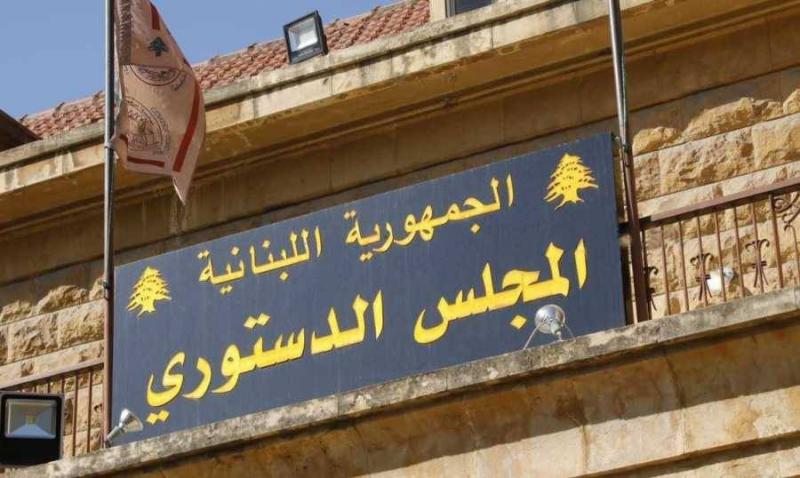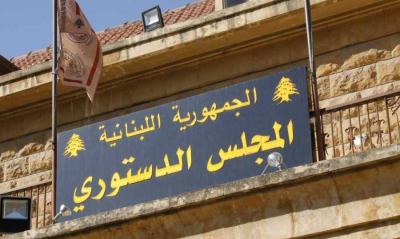History has repeated itself. As last year, the Parliament extended the term of the municipal and elective councils until May 31, 2024. This year, the Parliament resorted to extending it again until May 31, 2025, with the reason for this postponement shifting from technical difficulties in conducting elections due to financial and logistical issues to security reasons, particularly because of the ongoing war along the southern border between Hezbollah and Israel, as reported by "An-Nahar."
The general sentiment among opponents of the extension is leaning towards challenging this law, which, as is known, requires the signature of ten deputies to submit, similar to any challenge, since any law passed by the Parliament is subject to appeal before the Constitutional Council, whose decisions are final and binding.
As an introduction to his remarks on constitutional law, Professor Antoine Safi from the American University expressed, "We have entered a framework that breaks the principle of regular elections considering that the presidency is vacant and a caretaker government is acting in place of the president between legislation of necessity and non-necessity, and municipal councils are being extended for the third time." Safi stated to "An-Nahar," "We are in a democratic crisis. This does not mean that there can be logic in the matter of extension due to the war in the south or otherwise. But this matter is in the hands of the Constitutional Council, which studies these frameworks."
The general framework of the extension law for municipalities and elected officials was previously presented to the Constitutional Council last year. However, in Safi's legal reasoning, "even if there is an appeal on the same subject and the Constitutional Council rejected it for reasons explicated at the time in the text of the decision, the justifications that prompted the deputies to pass the extension law again yesterday could be new or different from those previously adopted. This forms a new legal basis that the Constitutional Council will study and decide upon. It is noteworthy that it is not bound to issue the same decision it made last year in its precise wording or the same justifications because it has discretionary authority for each case separately and for each law based on its specifics and the reasons put forth."
Thus, the Constitutional Council will examine the appeal(s) regarding the extension law for municipalities and assess whether the adopted law aligns with constitutional provisions to take a position on each point raised. Therefore, I do not believe the Constitutional Council will accept the appeal, as if stating the law is unconstitutional, given the warnings it laid out in its decision text last year regarding issues of vacancy and public order, as well as its definition of the theory of exceptional circumstances that shaped the general image in this direction. The Council remains capable of making a different decision than that which was previously made. However, I do not think that conditions have changed."
Former member of the Constitutional Council, Professor Antoine Massara, analyzed the situation further, indicating to "An-Nahar," "because the issue is larger and more dangerous than just the appeal itself. What has occurred is not only a breach of the constitution but a greater violation since the entire constitution is suspended due to the failure to elect a president." He predicts that the majority in the Council to issue a decision on the appeal(s) that will be presented will not be sufficient. Simultaneously, he ruled out its rejection, preferring to publish the session minutes, including the proceedings that took place.
In his view, regardless of the outcome of the appeal—whether accepted or rejected—it is expected to include a profoundly scientific interpretation concerning such crucial state-level issues, teaching politicians "a lesson." The parliament is closed; no president is elected, and the constitution is suspended, which underlines the role of the Constitutional Council. According to Massara, caretaker governance is associated with routine procedures for two days or a week at most, while other institutions are compelled to take necessary actions. Once a president is elected, the danger will dissipate, at which point these actions can be reviewed before the relevant authorities. He likens this to a sudden house fire and the fire brigade replying that they cannot respond due to those inside being in danger.
MP Melhem Khalaf reiterated his full solidarity "with our people in the south, which we always express, especially in the face of the brutality of the Israeli aggression, and there is no compromise on national solidarity." While the change MPs have not yet decided on the appeal, lawyer Khalaf shared his stance on the extension law, noting that the principle of power rotation is fundamental to the democratic system and that neither the Parliament nor the government has the authority to represent electoral commissions as they are not qualified, as this matter pertains to the electorate.
There is one exception, which is when extraordinary and compelling conditions do not exist, and this arrangement is permissible up to the extent of these exceptional circumstances, the theory of which is based on the condition of proportionality, a fundamental requirement among the four conditions of this theory. He affirmed that extraordinary circumstances allow for the postponement of elections for the necessary and urgent period solely within regions where elections are impossible, according to the proportionality criterion.
This reality has a precedent in the mountain region, as the modified municipal law No. 665/97 with law No. 316/2001 explicitly addresses the postponement of municipal elections in areas under occupation and places of displacement. Article 15 of this law No. 118/77, added provisions from Article 20 of law No. 665/97, states, "Municipal elections are conducted in all Lebanese areas according to the specified provisions of this law, except in cities and villages under occupation." The second paragraph of this Article 20 was amended by Article One of the aforementioned law 316 dated April 20, 2001, to read, "The government must call for municipal elections in cities and villages... as well as in cities and villages located in areas of displacement where reconciliation and return have not occurred, which shall be identified by a decree adopted by the Council of Ministers based on a proposal from the ministers of interior and municipal affairs. The government must call for municipal elections for these cities and villages whenever this becomes possible by a decision from the Cabinet."
Regarding the lack of municipal nominations, Khalaf considered that the Minister of Interior, who announced readiness to conduct municipal elections, should have proposed a technical postponement for a brief period in the south according to this law. He observes that covering the government's shortfall through unconstitutional legislation has now become a blanket coverage for the continuation of the vacancy in the state since the government could have taken on this technical postponement by following "An-Nahar."




